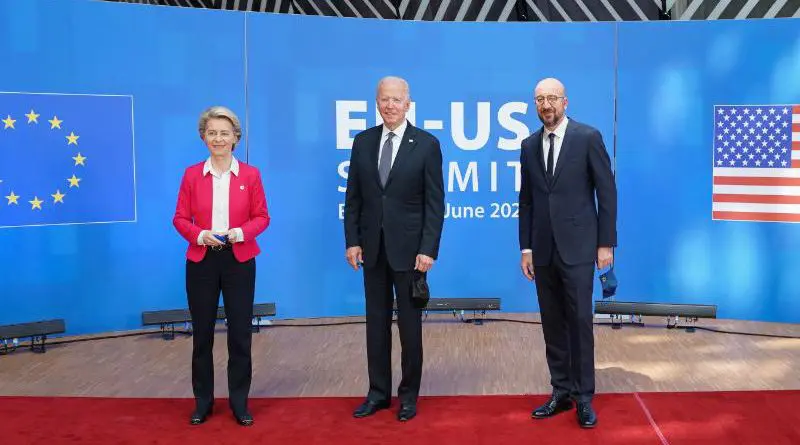‘America Is Back’: How About Europe? – OpEd
A number of recent events and decisions by Europeans indicate that they are not willing to resume pre-Trump EU-US relations
In an interview with AP, Germany’s Armin Laschet, who is to seek in September to succeed Angela Merkel as Chancellor of Germany, has recently asserted that Germany should continue to build economic relations with China. “China is a partner….wherever countries have a model of society that is different from ours, we need to win them over to join us — whether it is Russia, China or the Arab world.”
The rise of China as a near-peer rival implies that the US can no longer expect to simply defeat several competitors on its own. As a result, President Joe Biden’s task will be to re-energize not only American power but also the country’s vast network of allies.
The Biden administration has made rebuilding the relationship with Europe a top priority. However, a number of recent events and decisions show that the other side of the Atlantic doesn’t seem to be as eager and is not willing to confine its relations to the US.
For example, with the end of the administration that treated America’s closest allies with contempt while engaging dictators and rivals, the EU—led by Germany—rushed to finalize an investment deal with China before U.S. President Joe Biden took office. The comprehensive agreement on investment (CAI) between the EU and China, signed in December 2020 after seven years and 35 rounds of intensive negotiations, is a new roadmap for the two sides’ thriving markets. The two sides reached an agreement on the deadlock of foreign investment, and Chinese selflessly agreed that European companies would not be forced to choose Chinese partners to invest and trade directly with China.
In the same line, the world’s biggest free-trade agreement (The Regional Comprehensive Economic Partnership, or RCEP) signed in November last year between 10 member states of ASEAN and five Pacific countries, namely Australia, China, Japan, New Zealand and South Korea is also a clear signal of US strategic allies worries over their economic and geopolitical issues.
These were not the only recent actions that seemed to signal European disinterest in renewing a cooperative trans-Atlantic approach to shared challenges. The European countries have recently urged the European Commission to draft an “Indo-Pacific Strategy” by September this year. Until a few years ago, the European Union opposed this strategy, given the growing relationship with the United States and China. But as the European Union grapples with its neighborly relations and the United States with countless dilemmas in international relations, Europe has no choice but to accept the new and changed geopolitical conditions. Of course, the growing cooperation between the Indo-Pacific region, with half the world’s population and more than 40% of global GDP and the highest economic growth rates, along with China’s economic rise is one of the factors influencing this European decision.
By formulating this strategy, the European Union wants to redefine and operationalize its relations with major and important countries such as China, India, Japan and South Korea in this area. In particular, these three countries not only do not intend to confront China, but also seek to improve relations with Beijing. Given the decline of American power and the rapid rise of Chinese power, Europe is well-aware of the fact that the era of US-EU monopoly is over. Prior to the decline of the U.S. international role and the distrust created in transatlantic relations, it was meaningless to formulate a European strategy in the Indo-Pacific region without cooperating with the United States. With this move, it is expected that Europe will not side with the United States on some other important international issues. The only issue that still keeps Europe dependent on the United States is Moscow’s expansionism in continental Europe, of which Crimea may not be the last.
Nonetheless, just a few days ago, despite hundreds of arrests during continuous protests over the Putin regime’s decision to reclassify anti-corruption campaigner Alexei Navalny from an assassination target to a political prisoner, the EU’s top diplomat, Representative for Foreign Affairs Josep Borrell came to Moscow for discussions with Russian Foreign Minister Sergey Lavrov—a disturbing indicator that the EU was going about business as usual.
Meanwhile, work on the Nord Stream 2 gas pipeline from Russia to Germany has resumed in recent days, despite the fact that the US and certain European countries have long opposed the project, fearing it would jeopardize European energy security and provide Russian President Vladimir Putin with fresh chances to use gas as an instrument of political pressure.
All in all, recent developments indicate that EU does not want to have the same balance of relations with the US and its China and Russia political relations are not at all tense and cold. The European Union, as a geo-economic continent with dual economic and political requirements, has had an epiphany that there is no choice but to be close to powers other than the US. Unquestionably, Europe’s decision to formulate an Indo-Pacific strategy is in fact an independent but loosely organized European political gesture against the United States. The European economy is getting closer to China in the long run with the foreign investment agreement, and it is also revealing China’s global hegemonic tendencies towards the United States. This process will disrupt the post-World War II order which was based on greater American interests.
Under such circumstances, Europe will move closer to its political independence in cooperation with China, and after the ominous period of Trumpism, they will not wait for decisions based on Washington’s influence. If the Biden administration fails to dissuade EU from making more deals with China and Russia, Europe will gradually secede from the United States, which in turn may entail greater risks for the US and global security.
*Peter Rodgers is an international relations graduate of Penn State University

